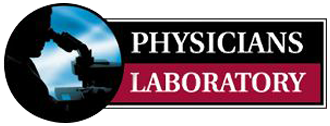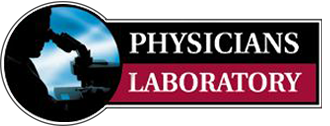Cytopathology
Cytopathology is a diagnostic technique that examines cells from various body sites to determine the cause or the nature of disease. The first cytopathology test developed was the Pap test, which has been widely utilized in the last 50 years for screening and diagnosing of cervical cancer and its precursors. The Pap test is considered the most successful screening test in medical history.
GYnecologic cytology
INTERPRETATION AND REPORTING:
Interpretation of Pap tests at Physicians Laboratory is performed by cytotechnologists and pathologists. In compliance with the CLIA regulations, supervisory level cytotechnologists perform random rescreen of at least 10% of all Pap tests daily before the reports are released.
Cases routed to the pathologist for review and signout include:
- Reactive/reparative specimens
- All tests containing cellular abnormalities
- Tests where the cellular pattern and clinical history do not correlate
- Any test where the screening cytotechnologist may question a totally benign state.
Endocervical Brush-Spatula Collection
Papette Collection
Broom-like Device Collection
- Patients should be tested during the last half
of their menstrual period. If taking a
Pap during a patient’s menstrual period cannot be avoided please swab the
cervix with a gauze prior to collection.
- Avoid using lubricant as this will clog the
filter (see information regarding approved lubricants below)
- Following collection immediately and vigorously
rinse the collection device in the vial.
Do NOT leave the collection device in the vial.
The use of lubricant during Pap test collection can increase the risk of obscuring the cell sample and also interfere with cell adherence on the slide. It is for those reasons that Physicians Laboratory strongly recommends that only lukewarm water be used to lubricate and warm the speculum. If lubricant must be used for patient comfort, below is a list of those that have been tested and approved by Hologic. Use of non-approved lubricant may result in an increase in unsatisfactory specimens.
- Surgilube
- Surgel
- Pap Test Lubricating Jelly (PP024)
- KY Jelly
RECOMMENDED SCREENING GUIDELINES
Click the link below for the 2014 ASCCP Management Guidelines.
ASCCP Management Guidelines
A summary of screening and management guidelines is provided below.
Patients < 21 years: No screening recommended.
Patients aged 21-29: Cytology alone is recommended every 3 years. HPV testing should NOT be used for screening in this age group, but is recommended as a reflex for ASC-US (not LSIL). For HPV-positive ASC-US or LSIL cytology or more severe: refer to ASCCP guidelines. For cytology negative or HPV-negative ASC-US rescreen in 3 years.
Patients aged 30-65: There are two recommended strategies:
1. HPV and cytology "co-testing" every 5 years (preferred)
2. Cytology alone every 3 years
Follow-up: HPV positive, Cytology Negative:
There are two kinds of follow-up options:
- Repeat co-testing in 12 months:
2. Immediate HPV genotype-specific testing for HPV or HPV 16/18/45.
- If the follow-up co-test is positive, women should be referred to colposcopy
- If the follow-up co-test is negative, women should be screened again with co-testing in 3 years.
If the follow-up co-test is positive, women should be referred to colposcopy
- Women over 30 testing positive for either HPV 16 or HPV 18/45 should be referred directly to colposcopy.
- Women testing HPV 16 or HPV 18/45 negative should be co-tested in 12 months.
If the follow-up co-test is negative, women should be screened again with co- testing in 1 year
Follow-up: HPV negative, ASC-US cytology: Repeat co-testing in three years
Women > 65 years of age: Women over 65 years of age with adequate screening history and no history of CIN2 or more severe diagnosis or cervical cancer within the last 20 years should NOT be screened for cervical cancer with any modality.
Women > 65 years of age with a history of CIN2 or more severe diagnosis:
Following spontaneous regression or appropriate management of CIN2 or a more severe diagnosis, routine screening should continue for at least 20 years even if this extends screening past age 65 years.
Women post-hysterectomy:
Women who have had a hysterectomy (removal of the cervix) should stop screening and not restart for any reason. If a cervix is still present screening should continue according to guidelines.
Non Gyn Cytology
Physicians Laboratory receives many different types of non-gynecological specimens. It is important that any specimen sent for cytologic evaluation be collected properly at the clinic or hospital laboratory. Specimen collection requirements and instructions are located under the Client Services tab. If your physician is unsure of how to collect or fix a specimen please refer to them or call our Client Services number at 1-605-322-7212. Many collection procedures are invasive to the patient and we want to be sure that specimens are optimally processed for the best results.
Molecular Testing For Specific Types of Non-Gyn Specimens
- Anal Cytologies for HR HPV testing (note that if genotyping is requested testing will be performed by another reference laboratory as genotyping is not FDA-approved for anal cytologies at this time)
- ThyGeNEXT Thyroid Oncogene panel and Thyroid miRNA Diagnostics for further classification of thyroid nodules of undetermined significance
- UroVysion enhanced bladder cancer detection using FISH


